- Home
- Karen Marie Moning
The Dark Highlander Page 2
The Dark Highlander Read online
Page 2
Not that he didn’t frequently gawk. He did. Flying on a plane had fashed him greatly. The clever engineering and fabulous construction of Manhattan’s bridges had kept him occupied for days.
The people, the masses of teeming people, bewildered him. He suspected they always would. There was a part of the sixteenth-century Highlander he’d never be able to change. That part would forever miss wide-open expanses of starry sky, leagues and leagues of rolling hills, endless fields of heather, and blithesome and bonny Scots lasses.
He’d ventured to America because he’d hoped that journeying far from his beloved Scotland, from places of power such as the standing stones, might lessen the hold of the ancient evil inside him.
And it had affected them, though it had only slowed his descent into darkness, not stopped it. Day by day he continued to change . . . felt colder, less connected, less fettered by human emotion. More detached god, less man.
Except when he tooped—och, then he was alive. Then he felt. Then he was not adrift in a bottomless, dark, and violent sea with naught but a puny bit of driftwood to cling to. Making love to a woman staved off the darkness, replenished his essential humanity. Ever a man of immense appetites, he was now insatiable.
I’m no’ entirely dark yet, he growled defiantly to the demons coiled within him. The ones who bided their time in silent certainty, their dark tide eroding him as steadily and surely as the ocean reshaped a rocky shore. He understood their tactics: True evil didn’t aggressively assault, it lay coyly hushed and still . . . and seduced.
And it was there each day, clear evidence of their gains, in the little things he did without realizing he was doing them till after they were done. Seemingly harmless things like lighting the fire in his hearth with a wave of his hand and a whispered teine, or the opening of a door or blind with a soft murmur. The impatient summoning of one of their conveyances—a taxi—with a glance.
Wee things, mayhap, but he knew such things were far from harmless. Knew that each time he used magic, he turned a shade darker, lost another piece of himself.
Each day was a battle to accomplish three things: use only what magic was absolutely necessary, despite the ever-growing temptation, toop hard and fast and frequently, and continue collecting and searching the tomes wherein might lie the answer to his all-consuming question.
Was there a way to get rid of the dark ones?
If not . . . well, if not . . .
He raked a hand through his hair and blew out a deep breath. Eyes narrowed, he watched the lights flickering beyond the park, while behind him, on the couch, the lass slept the dreamless sleep of the utterly exhausted. On the morrow, dark circles would mar the delicate hollows beneath her eyes, etching her features with beguiling fragility. His bed play took a toll on a woman.
Two nights past, Katie had wet her lips and oh-so-casually remarked that he seemed to be waiting for something.
He’d smiled and rolled her onto her stomach. Kissed her sweet, warm, and willing body from head to toe. Dragged his tongue over every inch, then taken her, ridden her, and when he’d finished with her she’d been crying with pleasure.
She’d either forgotten her question or had thought better of it. Katie O’Malley was not a fool. She knew there was more to him than she really wanted to know. She wanted him for sex, nothing more. Which was well and fine, because he was incapable of more.
I wait for my brother, lass, he hadn’t said. I wait for the day Drustan wearies of my refusal to return to Scotland. For the day his wife is not so pregnant that he fears to leave her side. For the day he finally acknowledges what he already knows in his heart, though he so desperately clings to my lies: that I am dark as the night sky, with but a few starlike flickers of light left within me.
Och, aye, he was waiting for the day his twin brother would cross the ocean and come for him.
See him for the animal he was.
If he permitted that day to arrive, he knew one of them would die.
A FEW WEEKS LATER . . .
2
Across the ocean in not Scotland but England, a land where Drustan MacKeltar had once erroneously claimed the Druids scarce possessed enough knowledge to weave a simple sleep spell, a hushed and urgent conversation was taking place.
“Have you made contact?”
“I dare not, Simon. The transformation is not yet complete.”
“But it has been many months since the Draghar took him!”
“He is a Keltar. Though he cannot win, still he resists. It is the power that will corrupt him, and he refuses to use it.”
A long silence. Then Simon said, “We have waited thousands of years for their return, as was promised us in the Prophecy. I weary of waiting. Push him. Give him reason to need the power. We will not lose the battle this time.”
A quick nod. “I will take care of it.”
“Be subtle, Giles. Do not yet alert him to our existence. When the time is right, I will do so. And should anything go wrong . . . well, you know what to do.”
Another quick nod, an anticipatory smile, a flutter of cloth and his companion was gone, leaving him alone in the circle of stones beneath a fiery English dawn.
The man who’d given the order, Simon Barton-Drew, master of the Druid sect of the Draghar, leaned back against a mossy stone, absently stroking the winged-serpent tattoo on his neck, his gaze skimming the ancient monoliths. A tall, lean man with salt-and-pepper hair, a narrow foxlike face and restless gray eyes that missed nothing, he was honored that such an auspicious moment had come in his hour of rule. He’d been waiting thirty-two years for this moment, since the birth of his first son, which had coincided with the day he’d been initiated into the sect’s inner sanctum. There were those like the Keltar, who served the Tuatha Dé Danaan, and there were those like himself, who served the Draghar. The Druid sect of the Draghar had kept the faith for thousands of years, handing the Prophecy down from one generation to the next: the promise of the return of their ancient leaders, the promise of the one who would lead them to glory. The one who would take back all the power the Tuatha Dé Danaan had stolen from them so long ago.
He smiled. How fitting that one of the Tuatha Dé’s own cherished Keltar now held within him the power of the ancient Draghar—the league of thirteen most powerful Druids that had ever lived. How poetic that one of the Tuatha Dé’s very own would finally destroy them.
And reclaim the Druids’ rightful place in the world.
Not as the much maligned, tree-hugging, mistletoe-gathering fools they’d permitted the world to believe them to be.
But as rulers of mankind.
“You’ve got to be kidding me,” Chloe Zanders snapped, raking her long curly hair from her face with both hands. “You want me to take the third Book of Manannán—and yes, I know it’s only a reproduction of a portion of the original, but it’s still priceless—to some man on the East Side who’s probably going to eat popcorn while he paws through it? It’s not as if he might actually read it. The parts that aren’t in Latin are in old Gaelic.” Fists at her waist, she glared up at her boss, one of several cocurators of the medieval collection housed in The Cloisters and The Met. “What does he want it for? Did he say?”
“I didn’t ask,” Tom replied, shrugging.
“Oh, that’s just great. You didn’t ask.” Chloe shook her head disbelievingly. Though the copy her fingers currently rested delicately upon was not illuminated, and was a mere five centuries old—nearly a thousand years younger than the original texts that resided in the National Museum of Ireland—it was a sacred bit of history, demanding utmost reverence and respect.
Not to be toted about the city, entrusted to the hands of a stranger.
“How much did he donate?” she asked irritably. She knew a bribe of sorts must have changed hands. One didn’t “check things out” of The Cloisters any more than one could stroll up to Trinity College and ask to borrow the Book of Kells.
“A jeweled fifteenth-century skean dhu and a priceless Damascus blade,” Tom sai
d, smiling beatifically. “The Damascus dates to the Crusades. Both have been authenticated.”
A delicate brow rose. Awe made short work of outrage. “Wow. Really?” A skean dhu! Her fingers curled in anticipation. “Do you have them already?” Antiquities; she loved them one and all, from the single rosary bead with the entire scene of The Passion carved on it, to the Unicorn Tapestries, to the splendid collection of medieval blades.
But she especially loved all things Scottish, as they reminded her of the grandfather who’d raised her. When her parents died in a car accident, Evan MacGregor swooped in and took the broken four-year-old to a new home in Kansas. Proud of his heritage, endowed with a passionate Scots temperament, he imbued her with his love for all things Celtic. It was a dream of hers to one day journey to Glengarry, to see the town in which he’d been born, to visit the church in which he’d wed Gran, to stroll the heathery moors beneath a silvery moon. She had her passport ready, waiting for that lovely stamp; she just had to save enough money.
It might take her another year or two, especially now with the cost of living in New York, but she would get there. And she couldn’t wait. As a child she’d been lulled to sleep on countless nights by her grandfather’s soft burr, as he’d woven fantastic tales of his homeland. When he died five years ago she’d been devastated. Sometimes, alone at night in The Cloisters, she found herself talking aloud to him, knowing that—though he would have hated city life even more than she did—he would have loved her choice of career. Preserving the artifacts and the old ways.
Her eyes narrowed as Tom’s laughter shattered her reverie. He was chuckling over her swift transition from outrage to wonder. She caught herself and pasted a scowl on her face again. It wasn’t hard. A stranger was going to be touching a priceless text. Unsupervised. Who knew what might happen to it?
“Yes, I have them already, Chloe. And I didn’t ask your opinion of my methods. Your job is to manage the records—”
“Tom, I have my master’s in ancient civilizations and speak as many languages as you do. You’ve always said my opinion counts. Does it or doesn’t it?”
“Of course it counts, Chloe,” Tom said, sobering swiftly. He removed his glasses and began polishing them with a tie that sported its usual accumulation of coffee stains and jelly-donut crumbs. “But if I hadn’t agreed, he was going to donate the blades to the Royal Museum of Scotland. You know how stiff the competition is for quality artifacts. You understand the politics. The man is wealthy, he’s generous, and he has quite a collection. We might be able to coax him to draw up some sort of bequest upon his death. If he wants a few days with a five-hundred-year-old text, one of the lesser-valued ones at that, he’s going to get it.”
“If he so much as gets one popcorn smudge on the pages, I’m going to kill him.”
“Precisely why I coaxed you here to work for me, Chloe; you love these old things as much as I do. And I acquired two more treasures today, so be a dear and deliver the text.”
Chloe snorted. Tom knew her too well. He’d been her professor of medieval history at the University of Kansas before he’d assumed a position as cocurator. A year ago he’d tracked her down where she’d been working at a depressing excuse for a museum in Kansas, and offered her a job. Though it had been hard to leave the home she’d grown up in, filled with so many memories, a chance to work at The Cloisters was not to be missed, no matter the extreme culture shock she’d suffered. New York was sleek and hungry and worldly, and in the sophisticated thick of it, the girl from rural Kansas felt hopelessly gauche.
“What, am I supposed to just walk outside with this thing tucked under my arm? With the Gaulish Ghost running around out there?” Lately there’d been a rash of thefts of Celtic manuscripts from private collections. The media had dubbed the thief the Gaulish Ghost because he stole only Celtic items and left no clues behind, appearing and disappearing like a wraith.
“Have Amelia package it up for you. My car’s waiting out front. Bill has the man’s name and address. He’ll drive you there and circle the block while you run it up. And don’t harass the man when you deliver it,” he added.
Chloe rolled her eyes and sighed, but gently collected the text. As she was walking out, Thomas said, “When you get back I’ll show you the blades, Chloe.”
His tone was soothing but amused, and it pissed her off. He knew she would hurry back to see them. Knew she would overlook his spurious acquisition methods one more time.
“Bribery. Abject bribery,” she muttered. “And it won’t make me approve of what you do.” But already she was aching to touch them. To run a finger down the cool metal, to dream of ancient times and ancient places.
Nurtured on Midwest values, an idealist to the core, Chloe Zanders had a weakness, and Tom knew it. Put something ancient in her hands and she was seduced.
And if it was ancient and Scottish? Sheesh, she was a goner.
Some days Dageus felt as ancient as the evil within him.
As he hailed a cab to take him to The Cloisters to pick up a copy of one of the last tomes in New York that he needed to check, he didn’t notice the fascinated glances women walking down the sidewalk turned his way. Didn’t realize that, even in a metropolis that teemed with diversity, he stood out. It was nothing he said or did; to all appearances he was but another wealthy, sinfully gorgeous man. It was simply the essence of the man. The way he moved. His every gesture exuded power, something dark and . . . forbidden. He was sexual in a way that made women think of deeply repressed fantasies therapists and feminists alike would cringe to hear tell of.
But he realized none of that. His thoughts were far away, still mulling over the nonsense penned in the Book of Leinster.
Och, what he wouldn’t give for his da’s library.
In lieu of it, he’d been systematically obtaining what manuscripts still existed, exhausting his present possibilities before pursuing riskier ones. Risky, like setting foot on the isles of his ancestors again, a thing fast seeming inevitable.
Thinking of risk, he made a mental note to return some of the volumes he’d “borrowed” from private collections when bribes had failed. It wouldn’t do to have them lying about too long.
He glanced up at the clock above the bank. Twelve forty-five. The cocurator of The Cloisters had assured him he would have the text delivered first thing that morn, but it hadn’t arrived and Dageus was weary of waiting.
He needed information, accurate information about the Keltar’s ancient benefactors, the Tuatha Dé Danaan, those “gods and not gods,” as the Book of the Dun Cow called them. They were the ones who had originally imprisoned the dark Druids in the in-between, hence it followed that there was a way to reimprison them.
It was imperative he find that way.
As he eased into the cab—a torturous fit for a man of his height and breadth—his attention was caught by a lass who was stepping from a car at the curb in front of them.
She was different, and it was that difference that drew his eye. She had none of the city’s polish and was all the lovelier for it. Refreshingly tousled, delightfully free of the artifice with which modern women enhanced their faces, she was a vision.
“Wait,” he growled at the driver, watching her hungrily.
His every sense heightened painfully. His hands fisted as desire, never sated, flooded him.
Somewhere in her ancestry the lass had Scots blood. It was there in the curly waves of copper-and-blond hair that tumbled about a delicate face with a surprisingly strong jaw. It was there in the peaches-and-cream complexion and the huge aquamarine eyes—eyes that still regarded the world with wonder, he noticed with a faintly mocking smile. It was there in a fire that simmered just beneath the surface of her flawless skin. Wee, lusciously plump where it counted, with a trim waist and shapely legs hugged by a snug skirt, the lass was an exiled Highlander’s dream.
He wet his lips and stared, making a noise deep in his throat that was more animal than human.
When she leaned back in
through the open window of the car to say something to the driver, the back of her skirt rode up a few inches. He inhaled sharply, envisioning himself behind her. His entire body went tight with lust.
Christ, she was lovely. Lush curves that could make a dead man stir.
She leaned forward a smidgen, showing more of that sweet curve of the back of her thigh.
His mouth went ferociously dry.
No’ for me, he warned himself, gritting his teeth and shifting to lessen the pressure on his suddenly, painfully hard cock. He took only experienced lasses to his bed. Lasses far older in both mind and body. Not reeking, as she did, of innocence. Of bright dreams and a bonny future.
Sleek and worldly, with jaded palates and cynical hearts—they were the ones a man could tumble and leave with a bauble in the morn, no worse for the wear.
She was the kind a man kept.
“Go,” he murmured to the driver, forcing his gaze away.
Chloe tapped her foot impatiently, leaning against the wall beside the call-desk. The blasted man wasn’t there. She’d been waiting fifteen minutes, hoping he might appear. A few moments ago she’d finally told Bill to go on without her, that she’d catch a cab back to The Cloisters and expense it to the department.
She drummed her fingers impatiently on the counter. She just wanted to deliver her parcel and go. The sooner she got rid of it, the sooner she could forget her part in the whole sordid affair.
It occurred to her that unless she could find an alternative, she was probably going to end up wasting the rest of her day. A man who lived in the East 70s in such affluence was a man accustomed to having others await his convenience.
Glancing about, she spied a possible alternative. Taking a deep breath and smoothing her suit, she tucked the parcel beneath her arm and strode briskly across the elegant grand foyer to the security desk. Two beefy men in crisp black-and-white uniforms snapped to attention as she approached.
When she’d first arrived in New York last year, she’d known instantly that she would never be in the same league with city women. Polished and chic, they were Mercedes and BMWs and Jaguars, and Chloe Zanders was a . . . Jeep, or maybe a Toyota Highlander on a good day. Her purse never matched her shoes—she was lucky if her shoe matched her shoe. Still, she believed in working with what one had, so she did her best to put a little feminine charm into her walk, praying she wouldn’t break an ankle.

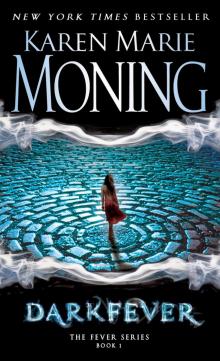 Darkfever
Darkfever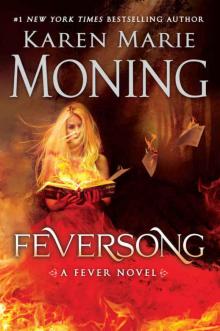 Feversong
Feversong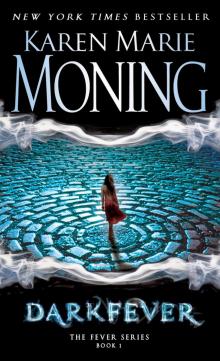 Faefever
Faefever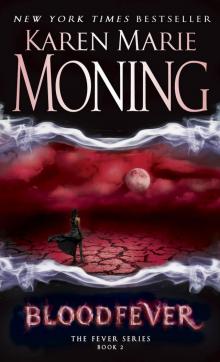 Bloodfever
Bloodfever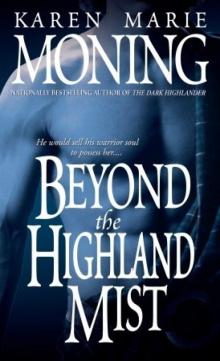 Beyond the Highland Mist
Beyond the Highland Mist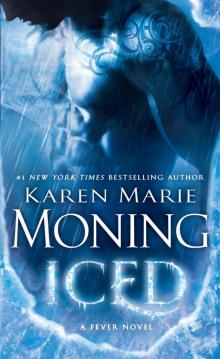 Iced
Iced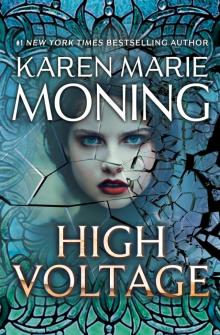 High Voltage
High Voltage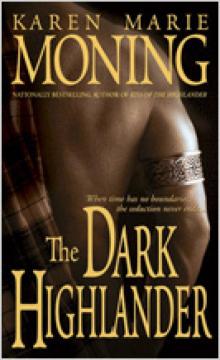 The Dark Highlander
The Dark Highlander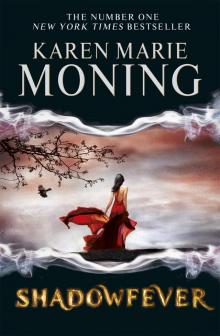 Shadowfever
Shadowfever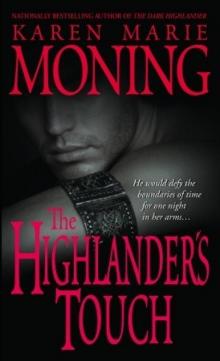 The Highlander's Touch
The Highlander's Touch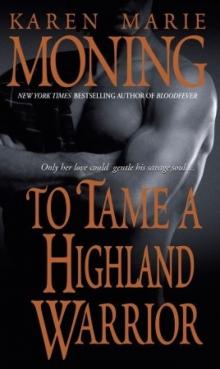 To Tame a Highland Warrior
To Tame a Highland Warrior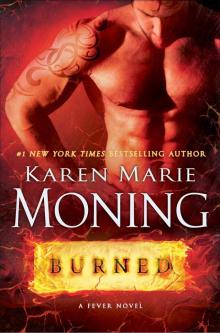 Burned
Burned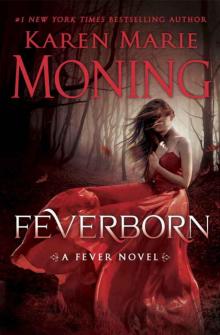 Feverborn
Feverborn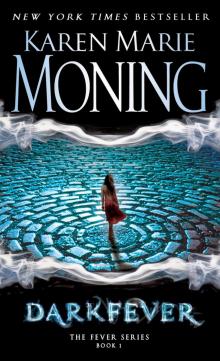 Dreamfever
Dreamfever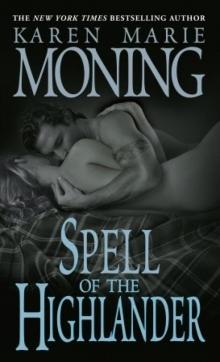 Spell of the Highlander
Spell of the Highlander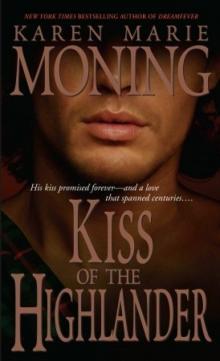 Kiss of the Highlander
Kiss of the Highlander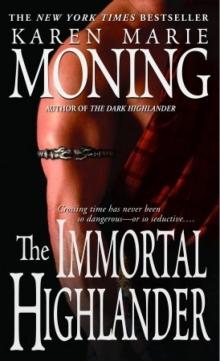 The Immortal Highlander
The Immortal Highlander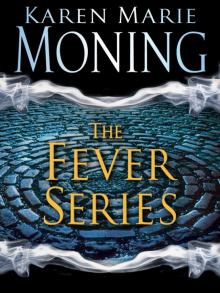 Karen Marie Moning’s Fever Series 5-Book Bundle: Darkfever, Bloodfever, Faefever, Dreamfever, Shadowfever
Karen Marie Moning’s Fever Series 5-Book Bundle: Darkfever, Bloodfever, Faefever, Dreamfever, Shadowfever Dreamfever f-4
Dreamfever f-4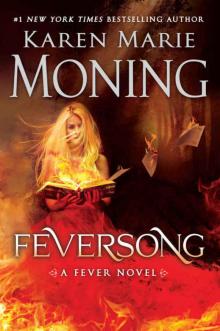 Feversong: A Fever Novel
Feversong: A Fever Novel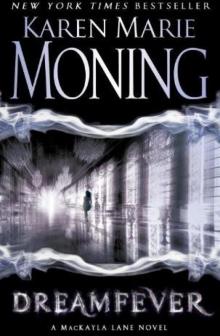 Dreamfever_The Fever Series
Dreamfever_The Fever Series The Highlander Series 7-Book Bundle
The Highlander Series 7-Book Bundle![[Highlander 04] - Kiss of the Highlander Read online](http://i1.bookreadfree.com/i1/03/29/highlander_04_-_kiss_of_the_highlander_preview.jpg) [Highlander 04] - Kiss of the Highlander
[Highlander 04] - Kiss of the Highlander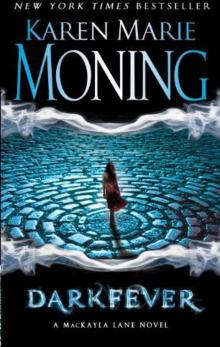 Darkfever_The Fever Series
Darkfever_The Fever Series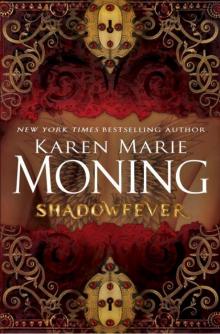 Shadowfever_Fever
Shadowfever_Fever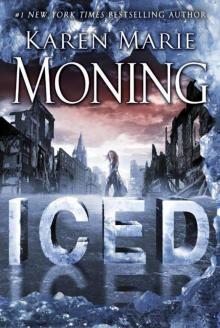 Iced: A Dani O'Malley Novel (Fever Series)
Iced: A Dani O'Malley Novel (Fever Series)![Fever [08] Feverborn Read online](http://i1.bookreadfree.com/i2/04/09/fever_08_feverborn_preview.jpg) Fever [08] Feverborn
Fever [08] Feverborn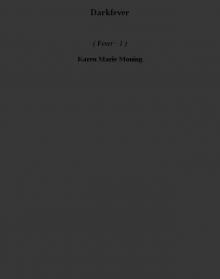 Darkfever f-1
Darkfever f-1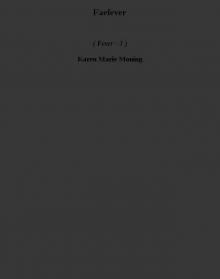 Faefever f-3
Faefever f-3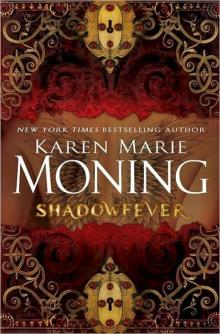 Shadowfever f-5
Shadowfever f-5 Bloodfever f-2
Bloodfever f-2